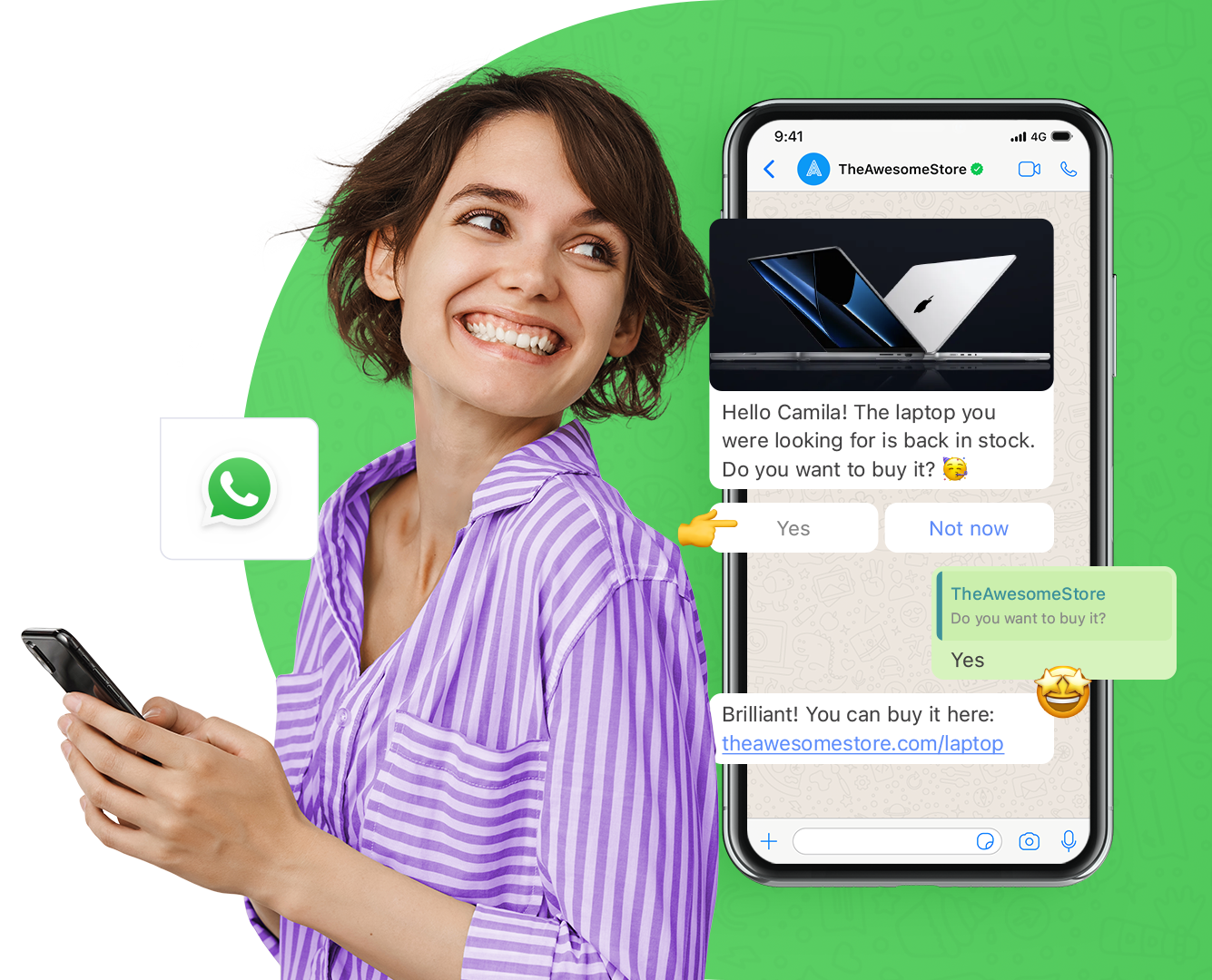
Introduction to WhatsApp Automations
In the current digital landscape, businesses are continually seeking innovative ways to enhance customer interaction and streamline communication processes. One of the most effective methods to achieve these goals is through WhatsApp automations. This practice enables companies to automate responses on the popular messaging platform, allowing for efficient and timely engagement with customers. As customer expectations evolve, the demand for immediate responses and proactive communication has intensified, making WhatsApp automations a crucial component of modern customer service strategies.
Automating interactions on WhatsApp not only improves the quality of customer service but also significantly saves time for businesses. By implementing automated messaging systems, companies can provide instant replies to common inquiries, address frequently asked questions, and ensure that customers receive consistent and accurate information without the need for human intervention. This efficiency allows human agents to focus on more complex inquiries and customer issues, ultimately enhancing the overall service experience.
WhatsApp automations can take various forms, ranging from automated greetings that welcome new customers to sophisticated chatbots capable of guiding users through sales funnels or assisting with troubleshooting. Additionally, businesses can deploy automated notifications for order confirmations, delivery updates, and appointment reminders, ensuring that customers are kept informed at every stage of their journey. As organizations begin to harness the power of these automations, it becomes evident that not only do they facilitate smoother communication, but they also foster greater customer satisfaction and loyalty.
As we delve deeper into the different facets of WhatsApp automations and their applications, it is important to understand how the use of chatbots can further enhance these processes. The integration of chatbots into the automation framework on WhatsApp signifies a transformative shift in customer engagement, setting the stage for more personalized interactions and tailored support.
The Rise of Chatbots in Customer Service
The modernization of customer service has seen a significant transformation with the advent of chatbots, particularly within platforms like WhatsApp. Chatbots are programmed systems designed to simulate conversation with users, which effectively allows businesses to provide assistance and answer queries without human intervention. The rapid growth in technology has made it feasible for organizations to implement these automated systems, leading to a new era of enhanced customer engagement.
One of the most prominent advantages of chatbots is their 24/7 availability. Unlike traditional customer service representatives, chatbots are always on, meaning customers can receive assistance at any time of the day or night. This constant accessibility caters to customers across different time zones and can significantly improve user experience. Furthermore, chatbots have the capacity to manage a high volume of inquiries concurrently. This capability is particularly beneficial during peak times when customer service teams might be overwhelmed. By efficiently distributing the workload, chatbots ensure that no query goes unanswered.
Quick response times further bolster the appeal of integrating chatbots into customer service strategies. Surveys have shown that customers increasingly prefer prompt replies when seeking assistance. Chatbots are able to provide instant responses to frequently asked questions, redirecting more complex queries to human agents only when necessary. This approach not only streamlines the communication process but also reduces customer frustration stemming from long wait periods.
Integrating chatbots with WhatsApp presents an opportunity to enhance user experience by allowing instant communication in a widely used messaging app. As businesses seek to improve their customer service frameworks, the adoption of chatbots represents a valuable investment in maintaining customer satisfaction and loyalty. Their efficiency, combined with the convenience of platforms like WhatsApp, paves the way for more effective customer interactions and support.
Understanding the Technology Behind WhatsApp Chatbots
WhatsApp chatbots operate through a combination of sophisticated technologies designed to enhance customer engagement by automating responses and facilitating seamless communication. At the core of these chatbots lies Natural Language Processing (NLP), a branch of artificial intelligence that enables them to comprehend, interpret, and respond to user messages in a human-like manner. NLP algorithms analyze the text input from users, identifying intent and extracting relevant information, thereby allowing the chatbot to formulate appropriate responses.
Building an effective WhatsApp chatbot requires a well-defined tech stack. Typically, developers utilize programming languages such as Python or JavaScript to create the chatbot’s logic. These languages support various libraries that simplify the implementation of NLP features, enabling chatbots to understand different languages and dialects, facilitating a broader reach and improving customer engagement. Additionally, integration with the WhatsApp Business API is essential, as it allows chatbots to send and receive messages on the platform efficiently.
Another essential element in the development of these chatbots is machine learning. With machine learning algorithms, chatbots can continuously improve their understanding over time, learning from past interactions and user feedback. This ongoing learning process enhances their ability to handle a variety of inquiries, ensuring that customers receive accurate and timely responses. For instance, if a user frequently asks about shipping times, the chatbot can adapt its responses to provide more relevant information based on previous queries.
Furthermore, utilizing platforms such as Dialogflow or Microsoft Bot Framework can significantly streamline the development process. These platforms provide tools and functionalities that aid in building more sophisticated chatbots, allowing developers to focus on the design and user experience aspects. By leveraging these technologies, businesses can deploy robust WhatsApp chatbots that not only address customer inquiries but also offer personalized recommendations, thereby fostering meaningful customer engagement.
Identifying Use Cases for WhatsApp Automations
WhatsApp automations have gained significant traction across diverse industries, transforming the way businesses interact with customers. By streamlining communication, these automations facilitate enhanced engagement and ultimately drive customer satisfaction. Industries such as retail, travel, and real estate exemplify how WhatsApp automations can be effectively deployed to improve operational efficiency and customer experience.
In retail, WhatsApp chatbots can be utilized to handle customer inquiries regarding product availability, order tracking, and personalized recommendations. For instance, a customer could interact with a bot to check if a specific item is in stock, thus reducing the need for human intervention. This leads to quicker responses and, consequently, an elevated shopping experience. By utilizing such automation, retailers can track metrics such as response time and customer satisfaction ratings, allowing them to assess the effectiveness of their customer support.
In the travel industry, WhatsApp automations can play a crucial role in booking confirmations, itinerary updates, and handling customer queries. Consider a scenario where a traveler receives real-time updates regarding flight changes or promotional offers from a chatbot. This not only keeps customers informed but also fosters a sense of reliability and trust in the travel brand. The success of these automations can be measured through response rates and customer retention metrics.
Real estate businesses also benefit from WhatsApp automations, especially in lead generation and client communication. A chatbot can facilitate initial inquiries from prospective buyers, providing information on properties, scheduling viewings, and even sending property images directly through WhatsApp. Tracking the conversion rates of these leads can help real estate agents evaluate the effectiveness of their automated interactions.
Ultimately, identifying appropriate use cases for WhatsApp automations not only streamlines operations but also cultivates stronger relationships with customers, laying the groundwork for sustained engagement and loyalty across various sectors.
Implementing WhatsApp Chatbots in Your Business
Integrating WhatsApp chatbots into your business can significantly enhance customer engagement, streamline communication, and improve overall service delivery. The first step in implementing a WhatsApp chatbot is selecting an appropriate automation tool that aligns with your business’s specific needs. Various platforms offer versatile features, allowing you to choose one based on customization, user-friendliness, and integration capabilities with your existing systems.
Once you have chosen an automation platform, the next crucial step involves defining the pre-set conversation flows. It is vital to outline the topics and scenarios that your chatbot will address. This requires a thorough understanding of your customers’ frequently asked questions and common concerns. Structuring the responses in a way that feels conversational and natural is vital to improve user experience. Utilizing a blend of open-ended questions and quick responses will help guide customers while facilitating effective communication.
As you develop the chatbot, consider creating a FAQ section which assists in addressing common inquiries automatically, thus reducing the burden on human agents. Additionally, implementing an escalation system where complex issues are handed off to a human representative can enhance customer satisfaction. This hybrid approach offers a seamless experience but must be carefully constructed to avoid customer frustration.
Nevertheless, challenges may arise during implementation, such as technical difficulties or poor customer reception. To mitigate these risks, conduct thorough testing of the chatbot before launching, soliciting feedback from a small group of users to identify areas for improvement. Post-launch, monitor performance metrics and customer feedback regularly, ensuring the chatbot continues to evolve alongside customer expectations. By maintaining flexibility and being open to adjustments, you can maximize the effectiveness of your WhatsApp chatbot, ultimately contributing to enhanced customer engagement in your business.
Improving Customer Experience with Automation
In an era defined by rapid technological advancements, the integration of WhatsApp automations and chatbots into customer service strategies has become paramount. These tools play a crucial role in enhancing customer experience by offering personalized and relevant interactions, ensuring that clients feel valued and understood. One of the main advantages of utilizing such technology is the ability to tailor communications based on individual customer preferences and behaviors.
Personalization in messaging can significantly improve engagement. When customers receive responses that align closely with their needs or previous interactions, it creates a sense of familiarity and attentiveness. For instance, businesses can automate greetings that incorporate the customer’s name or suggestions based on past purchases. This level of personalization transforms generic communications into meaningful interactions, fostering loyalty and satisfaction.
Relevance of responses is another critical component. WhatsApp chatbots are equipped with advanced natural language processing capabilities, allowing them to understand and respond to inquiries with high accuracy. By leveraging these technological features, businesses can ensure that customers receive prompt answers to their questions without irrelevant detours. For example, a retail company using WhatsApp automation successfully reduced response times to customer inquiries regarding shipment tracking, leading to enhanced customer satisfaction rates.
Quick resolution of queries is vital in today’s competitive landscape. Customers increasingly expect swift replies to their questions, and any delays can negatively impact their perception of a brand. By implementing WhatsApp automations, businesses can significantly reduce wait times, automating FAQs and simple inquiries while efficiently routing more complex issues to human representatives. For example, a telecommunications provider reported a 40% decrease in customer support response times after utilizing chatbots to handle routine tasks.
In conclusion, the integration of WhatsApp automations and chatbots not only personalizes customer interactions but also ensures that businesses provide relevant answers and rapid solutions. This innovative approach leads to an overall enhanced customer experience, fostering loyalty and improving efficiency across customer service operations.
Analytics and Reporting from WhatsApp Automations
In the realm of customer engagement, the integration of analytics and reporting with WhatsApp automations serves as a powerful tool for businesses aiming to enhance their communication strategies. By leveraging these features, organizations can gain valuable insights into customer interactions, ultimately empowering them to make informed decisions that promote satisfaction and loyalty. Key metrics that should be monitored include response times, customer satisfaction scores, and conversation completion rates.
Tracking response times is crucial as it directly reflects the efficiency of the communication process. Analyzing how quickly messages are acknowledged and addressed can help identify potential bottlenecks within the customer service framework. Businesses should continuously assess these metrics to reduce delays and ensure that customer inquiries are handled promptly, thereby improving the overall experience.
Customer satisfaction scores provide essential feedback on user experience with WhatsApp automations. Assessing customer sentiment through surveys or direct feedback mechanisms allows businesses to gauge how well their automated interactions resonate with users. A higher satisfaction score often correlates with effective automation strategies that are aligned with customer expectations. Monitoring and analyzing these sentiments can lead to actionable insights, driving necessary adjustments to chatbots or automated responses.
Additionally, tracking conversation completion rates is vital in determining whether customer interactions are concluded satisfactorily. A low completion rate might indicate that chatbots are failing to resolve issues or that the conversation flow is suboptimal. By regularly evaluating these rates, businesses can refine their automation processes, ensuring that customers receive comprehensive support.
Incorporating these analytics not only helps businesses address current challenges but also fosters an environment for continuous improvement. By adapting strategies based on data-driven insights, companies can enhance their WhatsApp automations, ensuring they meet evolving customer needs effectively.
Compliance and Best Practices for Using WhatsApp Chatbots
As businesses increasingly leverage WhatsApp chatbots for customer engagement, it is essential to consider regulatory and compliance aspects to ensure responsible usage. Data privacy is a paramount concern, given that customer interactions may involve personal and sensitive information. In accordance with the General Data Protection Regulation (GDPR) and other local laws, businesses must ensure that any data collected through chatbots is processed lawfully and transparently. This includes having clear data retention policies and only storing information that is necessary for the intended purpose.
Obtaining customer consent before engaging them via WhatsApp is another critical compliance requirement. For effective communication while adhering to regulations, businesses should implement opt-in mechanisms to gather explicit consent from users before initiating any automated conversations. Moreover, it is advisable to provide users with the option to easily revoke their consent at any time, thus empowering customers to maintain control over their personal data.
In addition to compliance with data protection laws, businesses should prioritize best practices in chatbot design and interaction. It is vital for chatbots to be intuitive, user-friendly, and capable of providing clear information to users. Properly designed chatbots should have the ability to direct users to human agents when necessary, ensuring that customers receive assistance that aligns with their needs. Additionally, maintaining a consistent and professional tone of voice throughout chatbot interactions contributes to positive user experiences.
Furthermore, businesses must regularly review and update their compliance strategies and chatbot functionalities to align with evolving legislation and customer expectations. In doing so, companies can effectively manage their risks while maximizing the potential of WhatsApp chatbots for enhanced customer engagement. A well-structured approach to compliance and best practices not only ensures legal adherence but also fosters trust and satisfaction among customers.
Future Trends in WhatsApp Automations and Chatbots
As businesses increasingly adopt WhatsApp automations and chatbots, the future of customer engagement via this platform is poised for significant evolution. Current trends indicate a substantial shift towards leveraging advanced artificial intelligence (AI) to create more sophisticated and intuitive chatbots. These enhancements will lead to improved interactions, capable of offering personalized experiences that cater to individual customer preferences. AI advancements enable chatbots to learn from customer interactions, making them progressively adept at handling complex inquiries and recognizing user sentiment, which will provide enhanced customer satisfaction.
Furthermore, the integration of WhatsApp automations with other messaging platforms is becoming a necessity in the multi-channel engagement strategy. Companies are likely to incorporate cross-platform capabilities that will allow seamless communication across various channels. This integrated approach will facilitate a more efficient customer engagement experience, regardless of the channel customers choose to use. Ensuring that chatbots can operate consistently across platforms will be crucial in retaining customer loyalty and maintaining brand voice.
Another trend on the horizon is the rise of advanced analytics, which will allow businesses to gather deeper insights into customer interactions. By analyzing data from WhatsApp chatbots, businesses can refine their engagement strategies, optimizing communication to meet evolving customer needs. This analytics-driven approach will not only improve customer support but also foster proactive engagement, enabling businesses to address potential issues before they escalate.
In conclusion, the future landscape of WhatsApp automations and chatbots is expected to be characterized by AI advancements and cross-platform integrations. Businesses that embrace these technologies will likely enhance their customer engagement strategies, bridging gaps in communication and providing tailored support. As the technologies evolve, organizations should remain adaptable, ready to implement these trends in their marketing strategies to foster lasting customer relationships.









